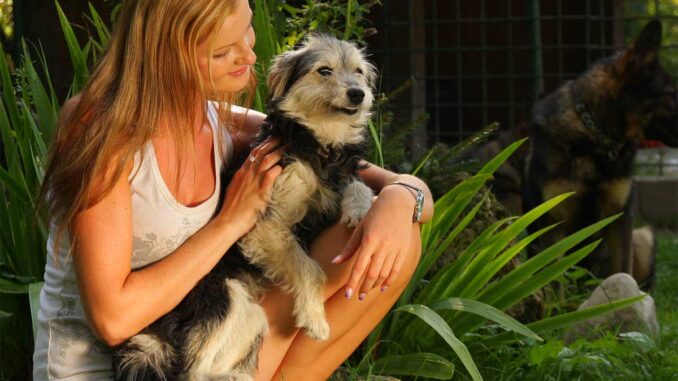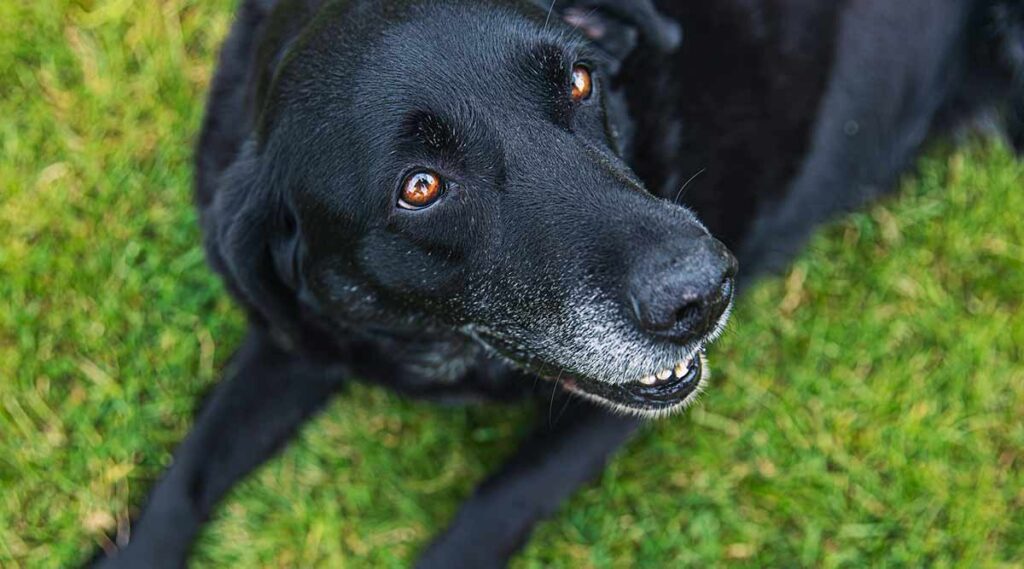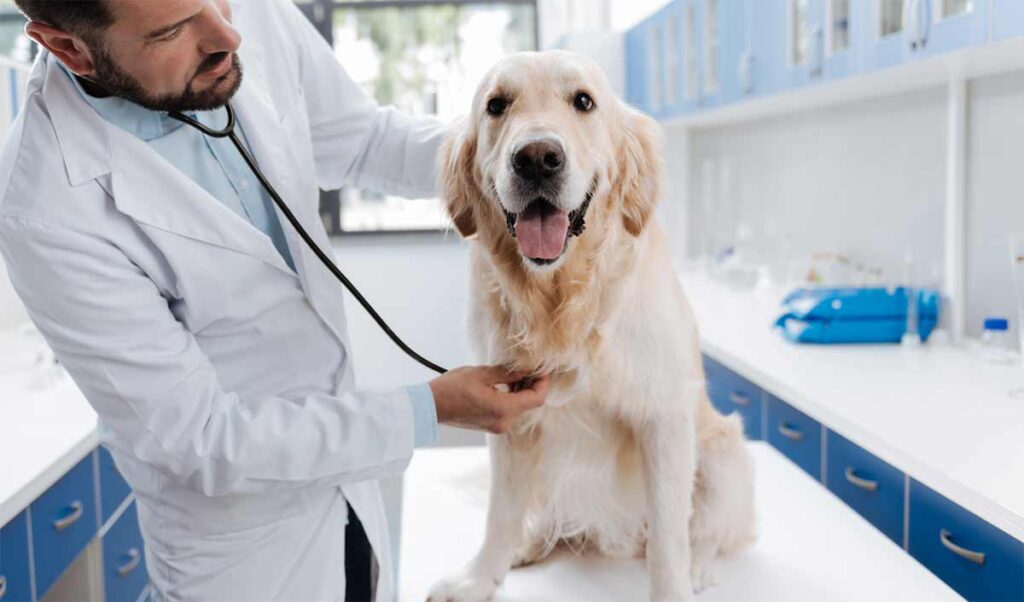
This article was updated on February 14th, 2024

As senior dogs get older, many owners may notice that their faithful companions begin to whine when trying to perform activities that they once found easy. Their older dogs may even start to whine at night or for no apparent reason.
While some dogs may whine for attention or food, an older dog that has recently started to whine is likely doing so because they feel uncomfortable or confused in some way, and as such, it is something that shouldn’t be ignored.
At my clinic, owners of senior dogs ask me about this situation all the time, and if it is something they should be concerned about. In this article, I will share the most likely reasons and how to help your dog.
Senior dogs often whine because they are uncomfortable or in pain

“While some dogs may whine for attention or food, an older dog that has recently started to whine is likely doing so because they feel uncomfortable, in pain or confused in some way, and as such, it is something that shouldn’t be ignored.”
Often expressed as a high-pitched vocalization, if your dog never used to whine when they were younger, then investigating why they may have started now is a good idea. Do some detective work and try to collect as much information as possible to help determine the reason why your dog is whining for no apparent reason.
Here are some of the most common causes of whining in older dogs
1. Pain: dogs struggling to perform basic movements might be whining because of pain
If your dog whines when struggling to get into certain positions or seems to be uncomfortable when performing basic day-to-day activities, they might be in pain. The most common causes of pain in older dogs include joint and abdominal pain (including arthritis). While these reasons can appear similar, they may have very different treatments, so it’s important to identify where your dog’s pain is originating. Let’s take a closer look:
> Arthritis
Arthritis is the most frequently diagnosed joint disease in veterinary medicine, and it presents significant challenges to the well-being of dogs. Up to 80% of senior dogs have some form of arthritis.
If your dog seems to whine when jumping on the sofa, climbing the stairs or when exercising, then they may have some form of musculoskeletal pain – that is, pain of the muscles, joints, or bones. Dogs suffering from these conditions will often vocalize as an expression of their discomfort:
“As a dog ages, so too do their joints; grinding of the joint surfaces and a gradual deterioration of the cartilage within the joint results in uneven wear, inflammation, and pain. Other than whining, common signs of arthritis include stiffness, muscle wastage, and a reluctance to exercise.”
Thankfully, there are many things you can do to help a senior dog with arthritis.
> Abdominal pain
Unlike musculoskeletal pain, a dog with abdominal pain may be uncomfortable and whine even when not moving. A hunched back, tense abdominal muscles, and even an enlarged stomach can all indicate pain originating somewhere within the abdomen. Abdominal pain can indicate a more serious underlying condition, including cancer, liver and kidney damage, or even internal bleeding.
If your dog is displaying these symptoms, especially if the pain is sudden in onset, then you should take them to the vet immediately where blood tests or an ultrasound scan can be performed.
Read our article about pain relief for senior dogs.
2. Repetitive, aimless whining without an apparent cause may also be a sign of dementia
Doggy dementia, also called Old Dog Syndrome, impacts many senior dogs. Dr. Barnett, a veterinary research fellow at Texas A&M, states that “28% of 12-year-old dogs and 68% of 16-year-old dogs have CCDS” (Source).
As dogs age into their senior years, their cognitive function gradually diminishes, like in humans. Symptoms include:
- pacing,
- confusion or disorientation,
- changes in sleeping habits,
- staring into space,
- performing previously learned tasks or tricks,
- whining
Dogs with dementia often whine for extended periods or at inappropriate times (such as the middle of the night). This behavior is often a result of their disorientation, confusion, or inability to navigate in familiar surroundings. Additionally, dementia can disrupt their sleep patterns, causing them to vocalize during the night instead of resting peacefully.
If your old dog is becoming less aware of their surroundings and losing interest in their favorite activities, it might be because their cognitive abilities are reduced.
3. Restless, high-pitch whining may be due to anxiety or fear

As dogs get older, they may become more reliant on their owners. Old dogs will sometimes whine if they are becoming anxious, especially when left alone. Separation anxiety can affect dogs of any age but often becomes worse as they age.
Dogs may also whine when something scares them, like a loud noise or changes in the environment. Elderly dogs that are stressed or anxious may also tremble or pant. Anxiety is a frequent reason why a dog may be whining at night.
To identify the cause, try to identify when your dog is whining
Understanding when or where a dog whines can help identify the reason behind their behavior
- Which situations make your dog whine? If your dog whines while jumping, climbing stairs or exercising, they may experience pain due to conditions such as arthritis.
- How long does the whining last? Short and sudden whining often indicates pain. Prolonged whining is more likely due to anxiety, boredom, or seeking attention.
- How often does your dog white throughout the day? Dogs with dementia may exhibit repetitive, aimless whining without an apparent cause. They may whine for extended periods or at odd times, such as during the night. Anxiety is a also frequent reason why a dog may be whining at night.
These details can help both you and your veterinarian pinpoint possible causes. While some causes of whining aren’t treatable, many are, and the sooner you investigate the cause of the whining, the faster an appropriate treatment can begin.
How a vet will diagnose the issue
Whining is a very non-specific symptom; it can be caused by pain, frustration, confusion, anxiety, or excitement, or it can be a sign of a more serious underlying disease.
If your dog has recently started whining regularly, the first step is to take them to your local veterinarian.

Questions to answer
Prior to your vet visit, be ready to provide the following information:
- Describe when the whining occurs: is your dog whining at night or during the day?
- Does whining happen in specific circumstances or for no apparent reason?
- How frequently does whining take place?
- Are there any other abnormal symptoms that you’ve noticed?
Clinical exam
“Your vet will perform a full clinical exam, including checking various neurological reflexes, and they will manipulate your dog’s limbs to test for any signs of stiffness or pain that may indicate arthritis. Blood tests can help investigate any organ dysfunction that may have been causing abdominal discomfort.”
The most important thing is to rule out any serious, potentially life-threatening conditions.
If your dog gets the all-clear, then their whining may be due to doggy dementia or anxiety issues. Ask your vet which drugs, if any, they would recommend.
A note about older dogs whining at night
When your older dog wakes up and gets up in the middle of the night, they might be confused, anxious, or in pain. There could be behavioral, cognitive, or environmental reasons explaining why your dog is not sleeping well through the night and waking up regularly:
- Incontinence: Some older dogs become incontinent and can’t hold it overnight. They might also need to go to the bathroom.
- Pain: If they suffer from pain, sleeping through the night may be challenging, and they may be looking for help.
- Dementia or anxiety: If they suffer from dementia or anxiety, it is likely that waking up alone in a dark room makes them restless and anxious. It could also simply be that they get worried about sleeping in a room alone without their owners.
Read our article: Why is Your Old Dog Restless at Night? for more details.
Disclaimer: This website's content is not a substitute for veterinary care. Always consult with your veterinarian for healthcare decisions. Read More.





Very good information about dogs in older age
Thank you for addressing this issue! My old dog has recently started whining at night, and I’ve been so worried about what might be wrong. I appreciate the tips shared in the post, especially about checking for discomfort and making sure he feels secure. I will definitely try some of these suggestions to help him settle down.
Thank you for this insightful post! I’ve been dealing with my old dog’s nighttime whining and didn’t know how to approach it. Your tips on checking for discomfort and providing a calming environment are really helpful. I’m going to try some of these suggestions tonight!
Thank you for sharing this! I’ve been experiencing the same issue with my older dog lately. It’s hard to see them in discomfort, and the advice on potential causes and solutions really helps. I’m definitely going to try some of the calming techniques mentioned. I appreciate the tips!
Thank you for addressing this issue! My old dog has started whining at night, and I’ve been worried about it. Your tips on checking for discomfort and ensuring a soothing environment are really helpful. I’ll definitely try some of your suggestions. Fingers crossed it helps!
Thank you for this post! My old dog has been whining at night, and I was feeling a bit helpless. I appreciate the suggestions on addressing his anxiety and comfort needs. It’s reassuring to know that I’m not alone in this. I’ll definitely try some of these tips!
I completely relate to this! My dog recently started whining at night, and it’s been exhausting. I didn’t realize it could be a sign of discomfort or anxiety. I’ll definitely try some of these suggestions, especially creating a more calming nighttime routine for him. Thanks for the helpful tips!
I completely understand what you’re going through! My old dog started whining at night too, and it was tough to figure out the cause. I found that some gentle stretching and more comfort in his bed helped a lot. Thanks for sharing these insights; I’ll definitely try out some of your suggestions!
Thank you for this insightful post! It’s comforting to know that my old dog’s whining at night might be due to common issues. I’ll definitely try some of your suggestions and keep an eye on her comfort. It’s tough to see our furry friends in distress, but your tips give me hope.